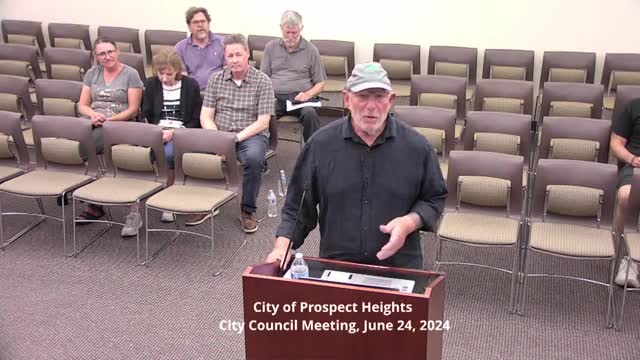City Commission Secures Major Donations to Enhance Community Projects
June 28, 2024 | Prospect Heights, Cook County, Illinois

This article was created by AI summarizing key points discussed. AI makes mistakes, so for full details and context, please refer to the video of the full meeting. Please report any errors so we can fix them. Report an error »

During a recent city commission meeting, members discussed the challenges and successes of their operational funding and community engagement efforts. Currently, the commission is unable to solicit funds, sell products, or charge for services, relying solely on their operational budget. Despite these limitations, they reported a strong community interest in their initiatives, with many residents inquiring about their nonprofit status and expressing a desire for similar programs in suburban areas.
The commission highlighted a series of donations that have significantly supported their activities over the years. Notably, an anonymous donor contributed $45,100 in 2016 to kickstart a summer intern program, which was so successful that the donor continued their support in 2017. However, funding for one intern position was lost in 2018, prompting the commissioners to step in and secure additional funding from local organizations, including the Rotary Club.
In recent years, the commission has seen a surge in community contributions, including a notable $204,000 donation from Dr. Chris Wood. These funds are strategically allocated to enhance public experiences, educational outreach, and visibility of the commission's work, rather than covering operational costs. For instance, a portion of the funds was used to plant 100 native plum trees in a local park, providing both ecological benefits and aesthetic improvements.
The commission also emphasized their commitment to maximizing donor contributions, ensuring that funds are utilized effectively to create lasting impacts. They have invested in educational materials, signage for public events, and matching grants for various projects, including a boardwalk that has transformed a local park.
As the commission continues to engage with the community and seek additional funding opportunities, they remain focused on enhancing their programs and fostering a deeper connection with residents.
The commission highlighted a series of donations that have significantly supported their activities over the years. Notably, an anonymous donor contributed $45,100 in 2016 to kickstart a summer intern program, which was so successful that the donor continued their support in 2017. However, funding for one intern position was lost in 2018, prompting the commissioners to step in and secure additional funding from local organizations, including the Rotary Club.
In recent years, the commission has seen a surge in community contributions, including a notable $204,000 donation from Dr. Chris Wood. These funds are strategically allocated to enhance public experiences, educational outreach, and visibility of the commission's work, rather than covering operational costs. For instance, a portion of the funds was used to plant 100 native plum trees in a local park, providing both ecological benefits and aesthetic improvements.
The commission also emphasized their commitment to maximizing donor contributions, ensuring that funds are utilized effectively to create lasting impacts. They have invested in educational materials, signage for public events, and matching grants for various projects, including a boardwalk that has transformed a local park.
As the commission continues to engage with the community and seek additional funding opportunities, they remain focused on enhancing their programs and fostering a deeper connection with residents.
View full meeting
This article is based on a recent meeting—watch the full video and explore the complete transcript for deeper insights into the discussion.
View full meeting
